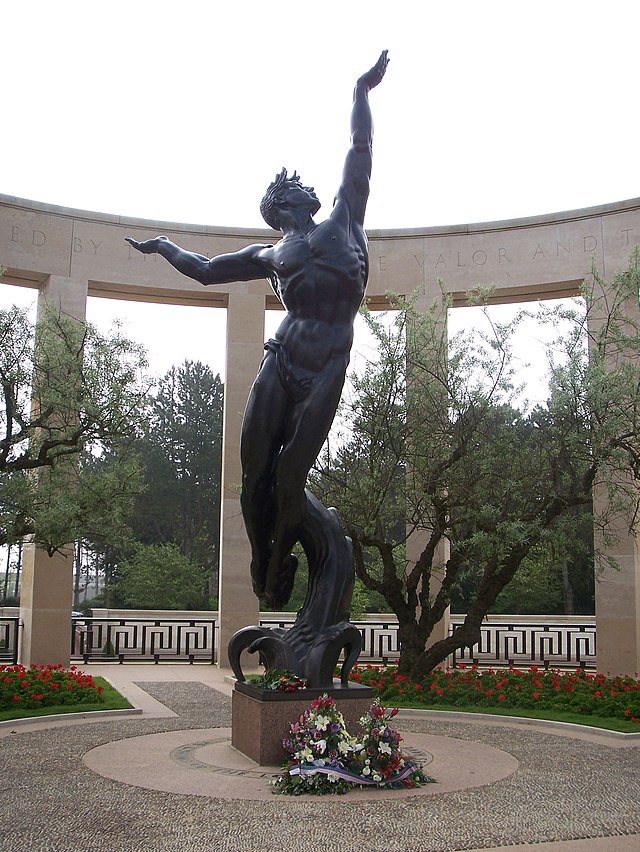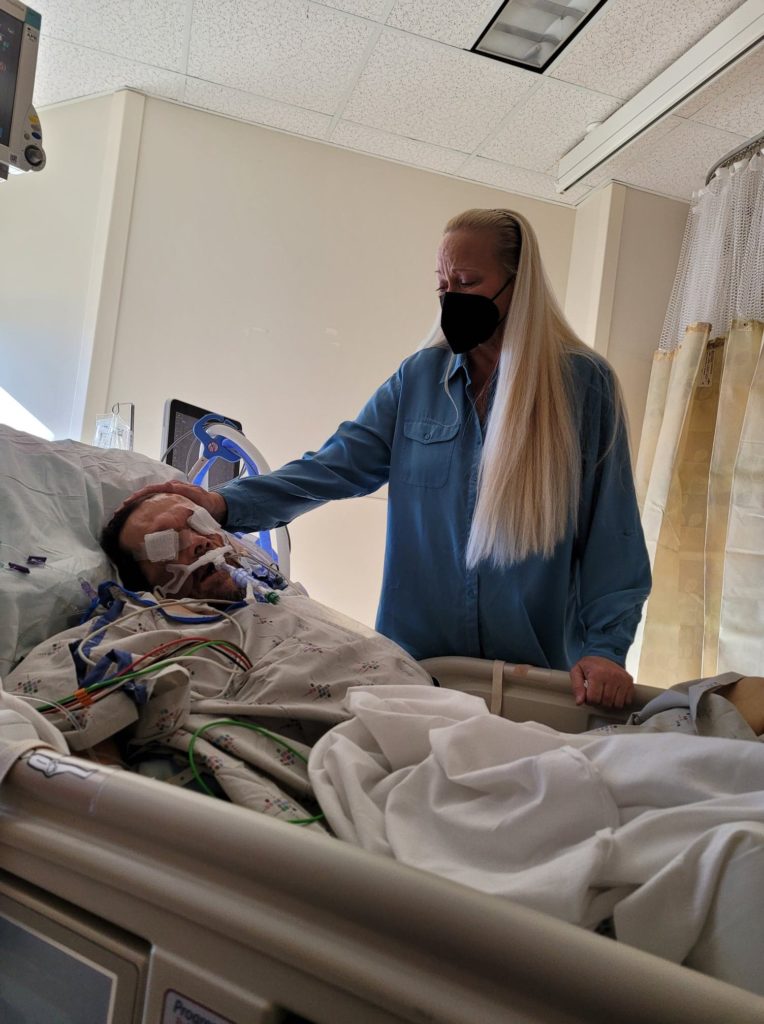Undulating above the 9,386 military graves at the American Cemetery and Memorial near Colleville-sur-Mer, Normandy, France, its head thrust back and its arms supplicating the heavens, is a bronze figure of terrifying benevolence. It was cast by the American sculptor Donald Harcourt De Lue and placed in 1951 above the cliffs at Omaha Beach, the most brutal of the five landing sites invaded by U.S. forces on June 6, 1944—D Day in World War II. The sculpture is titled “The Spirit of American Youth Rising from the Waves”.

I believe that a statue of similar significance should be struck and placed somewhere in America, preferably on a street in Vacaville, California, if the Solano County officials would tolerate such a thing. Call it “The Spirit of American Madness Rising from Our Streets and Jails and Graves.” The statue’s eyeless face would replicate the smashed and scarred features of the late James Mark Rippee, an appalling symbol of the atrocities that can befall a victim of brain-damaging mental illness in a nation that prefers to look the other way. The statue would represent all the oppressed and neglected mad people left to rot in society’s shadows in our time and throughout time.
I know: the very idea of this will strike many as grandiose. Grandiosity might be the only thing that “crazy” people and their overwhelmed protectors have left.

Mark Rippee died at age 59 from many complications in a Vacaville hospital on Tuesday, November 29. Some unidentified Samaritan had brought him there after noticing that he was on the ground, struggling to breathe. (Doctors found evidence of sepsis and pneumonia, among other symptoms.) For years following a horrific motorcycle accident in 1987, when he was 24, Mark had stumbled around the small city’s streets like a maimed animal from the Vaca mountains—hit twice by cars, at the mercy of vicious thugs who beat and robbed him, sleeping under newspapers in frigid winter nights, frequently arrested (unlawful camping was a common charge, for irony fans), suicide-prone, truculent and resistant to care because his derangement made him that way.

He was kept alive through the Sisyphean efforts of his twin sisters Linda Privette and Catherine Rippee Hansen, and the dozens of compassionate souls in the town who tracked him down and kept him supplied with water, food, and the blankets and canes and small change that were routinely stolen from him. Mark accepted their gifts and concern. He would not accept their strategies for guiding him to professional care. His affliction, steeped in paranoia, would not allow it.
And so, yes, Mark Rippee and his sub-nation of mad people deserve a statue. They are, have been, mass-casualties of war, just as were the eighty-nine million victims of World War II 1https://en.wikipedia.org/wiki/World_War_II_casualties, the forty million in World War I 2https://en.wikipedia.org/wiki/World_War_I_casualties, and all the casualties of all the wars fought since the beginning of time. It is a surreal war, this one, fought mostly by the losers: the “crazy” (chronically insane and brain-damaged) people themselves; their protectors and advocates; neurosurgeons and psychiatrists; some—not nearly enough—lawmakers and enlightened sheriffs of metropolitan jails. No statistics exist to tally the number of mad people who have lived, suffered, and died through history.
The mad people have always been losing this war. Their enemy, merciless, intractable, apparently invincible, is: Nothing. Nothingness. Silence. Indifference. Contempt.
And mute primal fear. The seriously mentally ill are unique among the world’s dispossessed in that their mere presence repels and terrifies. They reawaken ancient superstitions of demonic transformation. Myths of the vampire and the werewolf, the tale of Jekyll and Hyde—these fantasies merge seamlessly with medieval notions of insane people as monsters, their heads roiling with evil spirits that can be released only by boring a hole through the skull. And the most nightmarish notion of them all: What if I am one of them and don’t know it?
Best to keep away. And keep “them” away.
Particles of hope are coalescing. Print and broadcast journalism now cover mental-health issues with clarity and urgency hardly seen a decade ago. This surge could flow from the wave of grass-roots advocacy that sprang up at about the same time—the networking of infuriated victims’ mothers, internet-linked coalitions, advocacy groups in cities and towns, enlightened free-lance activists.
Two important examples come to mind. Both were published in medium-sized California newspapers (an endangered yet essential species in today’s communications world). The first was written by Joceyln Weiner of Cal Matters, a Salinas paper, and appeared in February 2020. Weiner has covered the Mark Rippee story for years and understands the web of vexed policy issues such as of forced treatment, which would enable the involuntary hospitalization of victims who need supervision but don’t want it and are entitled to reject it—people such as Mark Rippee.
Weiner also laid out the excruciating barriers to conservatorship, a court order that eluded the frequent desperate pleadings and petitions of Mark’s sisters. Conservatorship can let a court officer appoint someone to oversee the safety and interests of a person whose mental capacities are deformed. Cathy and Linda Rippee appealed with obsessive ardor, over years, to the Solano County Board of Supervisors for conservatorship of Mark. Every appeal has been denied on arcane policy grounds—hence their constant searches for their brother on Vacaville’s streets and alleys and strip malls. A fundamental reason for the rejections was that Mark Rippee was not (wait for it) “gravely disabled” and thus not eligible. He could do some things for himself, you see. Like crawl under a newspaper on a frigid night.
Another Alice-in-Wonderland rationale of the Board, as Weiner pointed out, was that Mark could not be conserved because each time he was placed on an involuntary hold, he stabilized to the point that he legally had to be released. Stable, and not disabled. Got it.
The second exemplary essay was published the day after Mark died, under the byline of the acclaimed Melinda Henneberger, writing in the Sacramento Bee. After a ten-year career at the New York Times, Henneberger won a Pulitzer Prize at the Kansas City Star in 2022, then moved to The Bee as a columnist. Her piece is at once empathetic toward Mark and lacerating toward those who did nothing as he wandered, weakened, and perished:
“I say ‘we’ let him die, let’s call the roll: Gov. Gavin Newsom vetoed state Sen. Henry Stern’s ‘Housing that Heals’ bill, which would have guaranteed the right to treatment for severely mentally ill and unhoused Californians like Mark . . . Mark thought the voices he heard were being broadcast by extraterrestrials from a military submarine using ‘mind warfare’ to turn ‘almost every single person in my life against me’ . . . Anyone who doubts that Mark was not capable of freely choosing or rejecting treatment can clear up his confusion by spending five minutes with one of the many untreated severely mentally ill homeless people screaming nonsense at no one on the streets of Sacramento and every other city.”
And as for the Rippees’ failed crusade to obtain conservatorship over Mark, Henneberger writes:
“Another bill that might have kept Mark alive was state Sen. Susan Eggman’s legislation, which would expand California’s definition of ‘gravely disabled’ to make it easier for people like Mark to get help. Though his initial diagnosis was a traumatic brain injury, he supposedly still didn’t qualify for a conservatorship on a medical basis. And in Solano County, he didn’t qualify for a conservatorship based on his mental illness, either. Every county interprets ‘gravely disabled’ differently.”

I personally have written many times about James Mark Rippee on my blog noonecaresaboutcrazypeople.com. The blog’s name is taken from my 2017 book, No One Cares About Crazy People, which I wrote following the suicide of my younger son Kevin, who had battled schizoaffective disorder for years. My friend and colleague Gail Freedman is directing a video expansion of the book.
James Mark Rippee is receiving, in death, a parcel of the attention and analysis that he was denied for most of his life. His sister Catherine predicted in her fury and grief that the attention will last for about a minute.
We—the all-inclusive and thus almost meaningless “we” that Melinda Henneberger sardonically referenced—must see that it lasts longer than that.
To assert this necessity is not to imply my belief that it will come about. The heartbreaking, blind wreckage of a man who for years shambled the streets of Vacaville may well vanish into “our” collective memory faster than a mass shooting. Yet “we,” and we, must try. To paraphrase Beckett, we can’t go on. We’ll go on. As Linda and Catherine Rippee vowed that they would do, “we”—the “we” who care about crazy people—will keep pushing for jail, prison, hospital, and public policy reform in the sub-nation of mental health care. We will keep pushing to free the crazy people from puerile and outdated restrictions such as the HIPAA laws. We will keep trying to educate our fellow citizens; to cleanse their “normal” minds of destructive superstitions. We will. . . well, we will.
A statue would help shore up our morale. It will not be an imposing statue, with its eyeless face and its smashed and scarred features. Yet those same qualities will invest it with beauty, and consecrate the cause.

